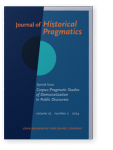Article published In:
Corpus-Pragmatic Studies of Democratization in Public Discourses: New perspectives, methods and materialsEdited by Turo Hiltunen, Turo Vartiainen and Jenni Räikkönen
[Journal of Historical Pragmatics 25:2] 2024
► pp. 193–214
